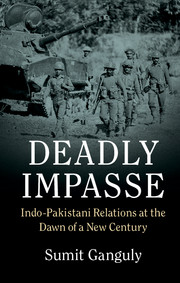Book contents
- Frontmatter
- Dedication
- Contents
- List of maps
- Preface and acknowledgments
- List of abbreviations
- 1 The rivalry revisited
- 2 Kargil and after
- 3 The troubled decade in Kashmir
- 4 The road to Operation Parakram
- 5 The composite dialogue and beyond
- 6 An extension of the rivalry
- 7 Policy implications
- In lieu of an epilogue
- Appendices
- Appendix A The Karachi Agreement
- Appendix B The Tashkent Declaration
- Appendix C The Shimla Agreement
- Appendix D The Lahore Declaration
- Appendix E The India-Pakistan Non-Attack Agreement
- Appendix F Charts, data and calculations by Jack Renner
- Appendix G Maps
- References
- Index
Appendix B - The Tashkent Declaration
from Appendices
Published online by Cambridge University Press: 05 March 2016
- Frontmatter
- Dedication
- Contents
- List of maps
- Preface and acknowledgments
- List of abbreviations
- 1 The rivalry revisited
- 2 Kargil and after
- 3 The troubled decade in Kashmir
- 4 The road to Operation Parakram
- 5 The composite dialogue and beyond
- 6 An extension of the rivalry
- 7 Policy implications
- In lieu of an epilogue
- Appendices
- Appendix A The Karachi Agreement
- Appendix B The Tashkent Declaration
- Appendix C The Shimla Agreement
- Appendix D The Lahore Declaration
- Appendix E The India-Pakistan Non-Attack Agreement
- Appendix F Charts, data and calculations by Jack Renner
- Appendix G Maps
- References
- Index
Summary
Tashkent Declaration
January 10, 1966
The Prime Minister of India and the President of Pakistan having met at Tashkent and having discussed the existing relations between India and Pakistan, hereby declare their firm resolve to restore normal and peaceful relations between their countries and to promote understanding and friendly relations between their peoples. They consider the attainment of these objectives of vital importance for the welfare of the 600 million people of India and Pakistan.
I. The Prime Minister of India and the President of Pakistan agree that both sides will exert all efforts to create good neighborly relations between India and Pakistan in accordance with the United Nations Charter. They reaffirm their obligation under the Charter not to have recourse to force and to settle their disputes through peaceful means. They considered that the interests of peace in their region and particularly in the Indo-Pakistan Sub-Continent and, indeed, the interests of the peoples of India and Pakistan were not served by the continuance of tension between the two countries. It was against this background that Jammu and Kashmir was discussed, and each of the sides set forth its respective position.
II. The Prime Minister of India and the President of Pakistan have agreed that all armed personnel of the two countries shall be withdrawn not later than 25 February 1966 to the positions they held prior to 5 August 1965, and both sides shall observe the cease-fire terms on the cease-fire line.
III. The Prime Minister of India and the President of Pakistan have agreed that relations between India and Pakistan shall be based on the principle of non-interference in the internal affairs of each other.
IV. The Prime Minister of India and the President of Pakistan have agreed that both sides will discourage any propaganda directed against the other country, and will encourage propaganda which promotes the development of friendly relations between the two countries.
V. The Prime Minister of India and the President of Pakistan have agreed that the High Commissioner of India to Pakistan and the High Commissioner of Pakistan to India will return to their posts and that the normal functioning of diplomatic missions of both countries will be restored. Both Governments shall observe the Vienna Convention of 1961 on Diplomatic Intercourse.
- Type
- Chapter
- Information
- Deadly ImpasseIndo-Pakistani Relations at the Dawn of a New Century, pp. 140 - 142Publisher: Cambridge University PressPrint publication year: 2016

